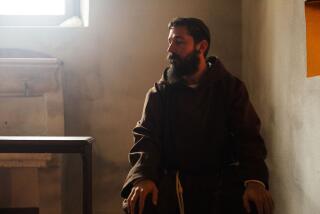No fangs in sight; ‘Bel Ami’s’ social commentary is bloodless
- Share via
As a ruthless social climber in 19th century Paris, Robert Pattinson bares his incisors, and a few other things, without revealing the slightest suggestion of his character’s inner life. “Bel Ami” is not the first screen adaptation of the Guy de Maupassant novel (a 1947 version starred George Sanders), and it’s not Pattinson’s first work in a period film (he played Salvador Dali in”Little Ashes”); in neither category will it stand as one for the ages.
The book is subtitled “The History of a Scoundrel” and there’s no question that Pattinson’s Georges Duroy is an unlikable rogue. But that’s pretty much all he is, and as scoundrels go, he’s not particularly interesting or charismatic. As the film opens in 1890, Georges has just returned, broke, from military service in North Africa. A chance meeting with a fellow veteran, Charles Forestier (Philip Glenister), brings him into the fold of Parisian society and its leading journalists, where he quickly gleans the rules of the game and embarks on a series of affairs with the wives of powerful men.
In his long-running assignations with the coquettish Clotilde (Christina Ricci), Georges comes closest to experiencing love. But mainly he’s eyeing the rungs of the ladder, gauging his opportunities for advancement and using his virility to achieve his goals. With Virginie (Kristin Scott Thomas), the demure wife of newspaper editor Rousset (Colm Meaney), the fleeting pretense of romance gives way to a final act of devastating cruelty.
But in his marriage to Madeleine (Uma Thurman) — an alliance secured at her husband’s deathbed — it’s less easy for Georges to maintain the upper hand. An intense instance of sexual power play between them speaks volumes. Not one to be possessed, she’s a behind-the-scenes force at La Vie Française, the paper where the unqualified Georges has landed a job as a writer, delivering copy dictated by Madeleine.
Georges’ identity as a journalist is a farce. But no other identity emerges in the overwrought but underdeveloped screenplay by Rachel Bennette or in Pattinson’s performance. From beginning to end of the movie, Georges is unformed, all appetite — for women, money, prestige — with no convincing drive behind his behavior. His peasant background is mentioned and, like everything else about him, it remains on the surface, along with his moue and sneer. There’s no evidence of complexity or conflict to deepen the role.
Directors Declan Donnellan and Nick Ormerod, theater veterans making their first feature, succeed at capturing the affluence and experimentation in Belle Époque France, if not in generating dramatic momentum. Amid the salons and soirees, the persuasive newsroom clamor and “love nest” afternoons, the score by Lakshman Joseph de Saram and Rachel Portman helps to emphasize the spiritedness of the milieu, even as the characters grow increasingly cynical and callous. Intriguing political aspects of the story involving military designs on Morocco and the influence of the media would have more resonance if the human drama had more heft.
Thurman, Meaney and Scott Thomas acquit themselves well, while Ricci’s Clotilde is sweet yet posed. Pattinson, who has delivered some strong performances in non-”Twilight” fare, might be exploring the flip side of the Team Edward swoon factor but, finally, his Georges is merely vampiric.
More to Read
The biggest entertainment stories
Get our big stories about Hollywood, film, television, music, arts, culture and more right in your inbox as soon as they publish.
You may occasionally receive promotional content from the Los Angeles Times.










